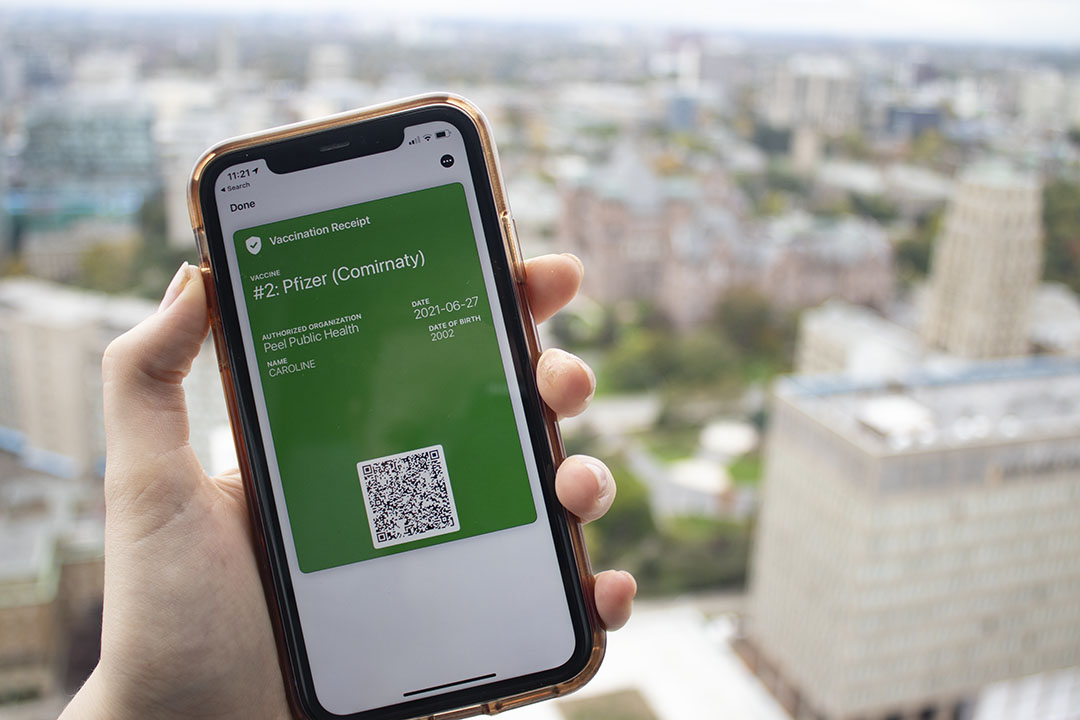In our fight against COVID-19, experts have portrayed vaccines as the next step forward; hence, Ontario has implemented a vaccine passport to safeguard its citizens. While this is a great and reassuring step toward normalcy and safety, it has not been easy for people who were vaccinated outside of Ontario, and I believe that U of T should take some responsibility in helping its students navigate this process.
Ontario now requires that citizens have proof of vaccination to enter select settings. Recently, the format of the provincial vaccine passport has changed — up until October 15, citizens could show a digital or printed proof of vaccination receipt to enter select settings. Now, the province is rolling out a QR-code based passport system.
These new vaccine passports are automatically generated and available on the government’s website for people who have an Ontario health card and have received both their doses in Ontario. However, those vaccinated elsewhere who are seeking the new passports are directed to one of two agencies. Those with an Ontario health card are instructed to call their public health unit, while those without must call the Provincial Vaccine Contact Centre.
International students made up approximately 26 per cent of U of T’s student body across the university’s three campuses in the 2020–2021 academic year. When you add all the students coming from out of province or who were vaccinated elsewhere, it is evident that a large number of U of T students may be experiencing confusion and panic regarding the vaccine passport. I certainly am.
Even though the system has changed over this past week, the past process — which was convoluted and difficult to navigate — left many confused on where they stand in the vaccine passport process.
Ontario’s announcement about its vaccine passport had rather unclear instructions about how to get one. There was a transition time where you were allowed to use vaccine certificates or receipts from elsewhere in place of a passport, but I couldn’t find this anywhere on the Government of Ontario website.
One of my friends who got vaccinated in British Columbia spent hours waiting on a call with Health Services Toronto. They had been directed to call them by the Government of Ontario website, but they later discovered that there was a way to apply for the vaccine passport on the City of Toronto’s website. My friend was just one of a number of students in this position. A handful of those other students, including me, had to learn information about the vaccine passport through word of mouth and Instagram stories. There seems to have been no communication about it from the university’s side.
Let’s also not confuse applying for passports with acquiring them, because many of us are still waiting for Toronto’s health department to get in touch with us. To be more specific, on their website, we were asked to fill out our contact details and proof of vaccination. Following this, we were told that someone from the health department would contact us.
However, this process is taking longer than any of us expected. The vaccine passport app has already rolled out, and the uncertainty in the application process has been a huge source of stress for many students, especially those who applied on the website weeks ago.
On a personal level, another source of stress has been showing my Indian vaccine certificate, having people spend a good amount of time looking at it with a puzzled expression, and then having to explain that ‘COVISHIELD’ is actually another term for ‘AstraZeneca.’ For international students who have received Health Canada-approved vaccines under different names, or have vaccine certificates in entirely different formats, showing our vaccine passport has been even more nerve-wracking than usual.
Overall, this situation has put a number of students in an inconvenient position, and it’s something that we still need to pay attention to. As many international and out-of-province students wait to hear back about their vaccine passport applications — and as the QR code rollout begins — there are many ways that U of T could be supporting its students who may be confused about Ontarioʼs vaccine passport system.
The first step would be simply sending out a document explaining the application process for students who are still in the dark. U of T could also work with Toronto’s health department to see if there can be an office designated on campus where students can book an appointment and come in with their documents to be able to get their vaccine passport.
Alternatively, U of T could accelerate the application process by verifying the information that the health department needs, such as the validity and details of the vaccines students have taken and their COVID-19 history, so the health department can give out the vaccine passport without having to verify it themselves.
U of T’s presence in Toronto — and its population — is so large that it ought to be able to work with the local health department to find a viable, helpful solution.
Shreya Vanwari is a second-year psychology student at Woodsworth College.


